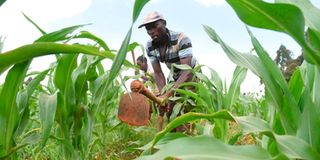Farming means business; let us cultivate sector

Joel Mutai and Everlyne Shitakwa weed a maize farm at Bondeni in Uasin Gishu County on May 24, 2021.
What you need to know:
- Attempts at transforming smallholder agriculture often fail to achieve the desired effect.
- Agriculture is a means to create wealth for those who engage in it.
Smallholder farmers in Africa manage just 12 per cent of its agricultural land, out of which they produce more than 80 per cent of the continent’s food. Although many lack formal education, they embrace modern innovations to increase productivity and profits.
But farmers face enormous hurdles — from natural risks to systemic ones. Yet the rules of the economy apply to them as much as to any other business.
Agriculture gives life to our economic aspirations. In Sub-Saharan Africa, the sector is 11 times more effective at reducing extreme poverty than any other. As human populations grow,the demand for food increases. But attempts at transforming smallholder agriculture often fail to achieve the desired effect since many perceive farming as too small to drive change and smallholders as requiring charity.
It is time we viewed farming as a business. Farmers use land, labour and capital — in the smallest quantities they can — to produce food and earn a living. Agriculture is a means to create wealth for those who engage in it. This business aspect ought to complement, not take away from, the public benefit of food production for farming enterprises.
Farming for the market is risky. Markets are variable and unpredictable and produce perishable. For their enterprises to make financial sense, farmers need access to ready markets that also pay well.
While they have traditionally depended on local markets, it is possible to access regional and international markets. Smallholders do not individually produce large enough quantities to export, and this is where the private sector can step in.
Crop diversification
With collaboration with the government, the private sector can create better value for farmers. Private organisations can purchase seed and fertiliser to distribute to farmers and commit to purchasing the produce from them once it is harvested. In turn, farmers can use the money they earn to repay their inputs and keep the rest as profit.
The above market model also speaks to an oft-overlooked aspect of food production: Diversification. Crop diversification is an important coping mechanism for income, nutrition, production and marketing risks in agriculture.
Introducing new crops disrupts pest and disease cycles, provides access to new markets, offers higher chances of harvesting despite severe weather and improves access to foods and nutrients, thus improving farmers’ resilience. With alternative crops, farmers can eat and earn better from their work.
But there have been impressive strides . The private sector is spearheading the work needed to propel farming to the next stage — driving agricultural productivity, opening up markets and facilitating increased private investment in agriculture. The government can help to accelerate its scaling and adoption by addressing constraints such as high business costs and market regulation.
If we can further smooth out collaboration between these entities, we will be a lot closer to agriculture as it should be — as a business.
Mr McCourt is government relations lead at One Acre Fund-Kenya. [email protected]. @Koomemccourt





